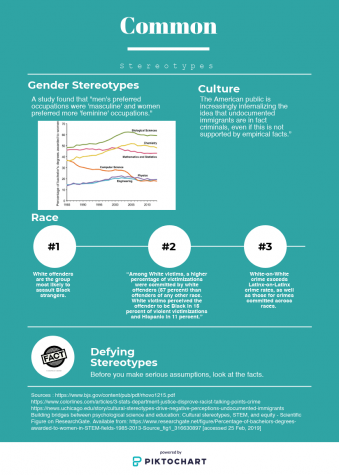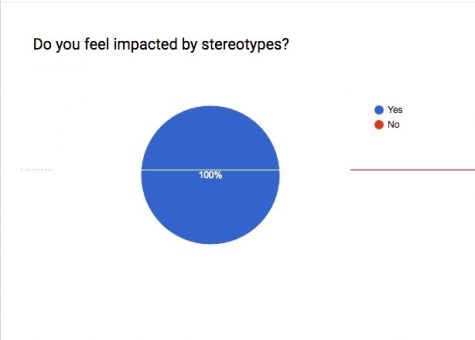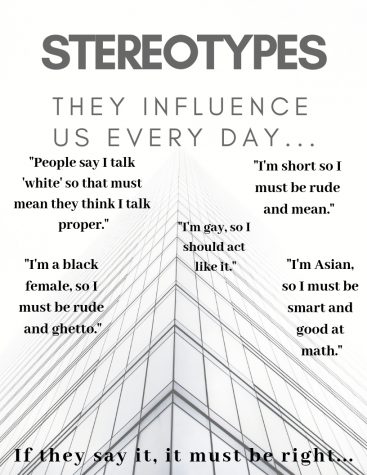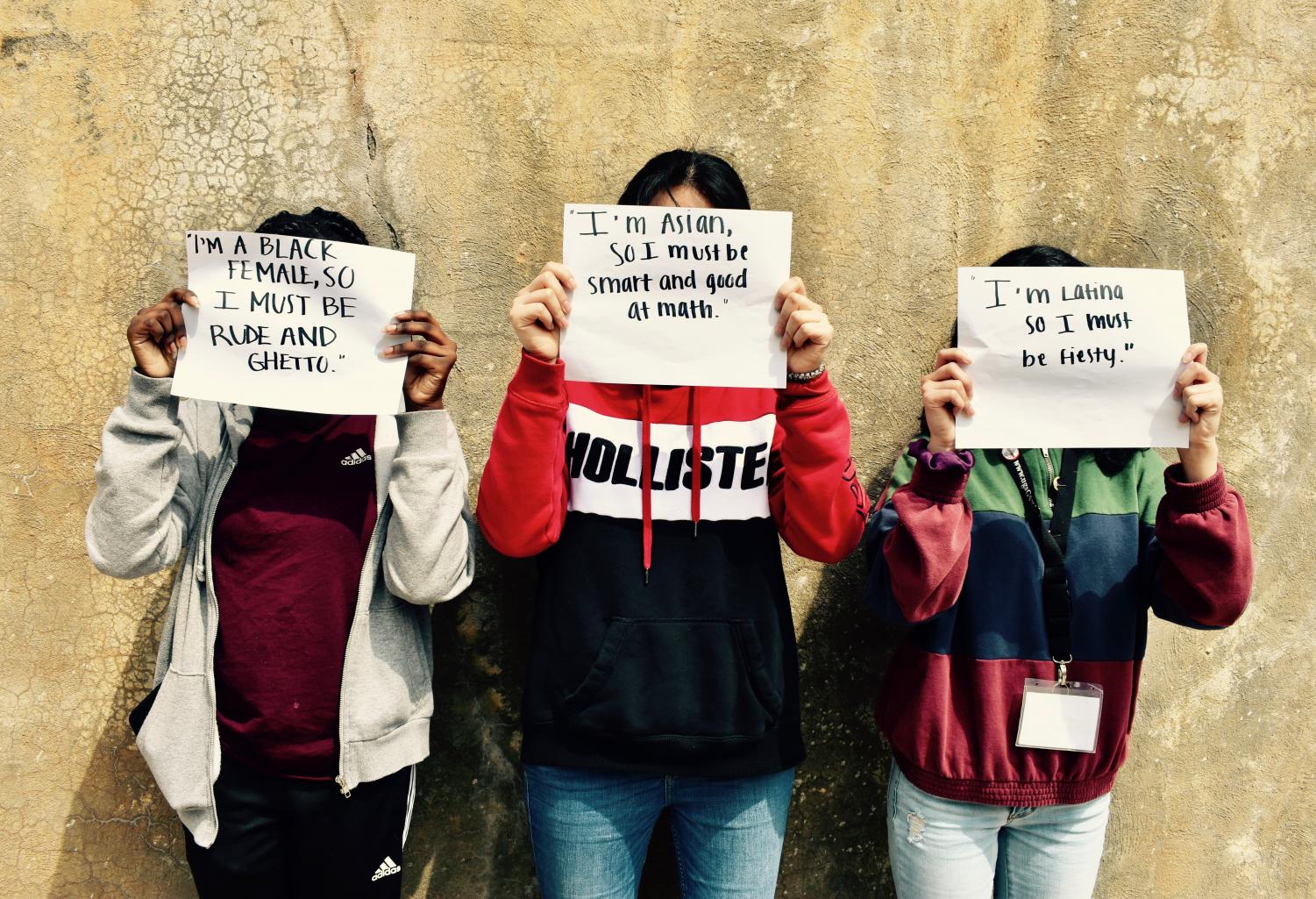Stereotypes: effects on the young minds of students in NC
April 25, 2019
Stereotypes, society’s way of grouping individuals into commonly misunderstood perceptions of people, and a way for justifying their actions based on their race, ethnicity, culture, and overall characteristics. While stereotypes can hold positive connotations, they generally imply negative intentions.
“The stereotype is a generalization that doesn’t take individual differences into account,” preface to introduction to Sociology said.
Due to its overall disregard for boundaries of individualism, people of all groups do not fall short of experiencing these stereotypes.
“Stereotypes are powerful. They often influence the types of careers people see themselves in and ultimately choose. Previous research shows that society associates not just ability in math and science with men and boys but also the notion of being “brilliant” — of having raw brainpower.” the National Science Foundation said.
Still, these stereotypes exist beyond the walls of NC, and further into the world. Unfortunately, media interpretation further instills the concepts of stereotypes in the minds of anyone watching. Movies display Asians as the insanely smart ones, Latinos as immigrant families lacking knowledge, or African-Americans as gangsters. Racial and gender stereotypes commonly found in the media can cause offense to those watching, and continue to normalize the prejudice towards these groups through the use of comedy.
“Characters of color remain underrepresented in mainstream movies and TV shows, and those actors who land roles are often asked to play stereotypes—from maids and immigrants to thugs and prostitutes. This overview breaks down how blacks, Hispanics, Native Americans, Arab Americans, and Asian Americans continue to face stereotypes on both the big and small screen,” writer for education, race, and cultural issues in ThoughtCo Nadra Kareem Nittle said.
The media uses black individuals as a way to display harsh or aggressive behaviors and expect black women to talk back and show attitudes.
“People place judgment on me based on stereotypes and begin to do discriminatory things towards me. They think I’m ghetto just because I express myself. They assume I do voodoo, that my hair is unprofessional, my facial features are unattractive (Afrocentric features), or that I’m a thief. I encounter these stereotypes weekly. I feel like I have to do well in everything that I do in school or else I’ll be considered just another ‘lazy black person’ or become the stereotype that people see me as. I feel that I carry the weight of the entire black community anytime I do anything because what one of us does for some reason represents the whole community,” junior Juliana Charles said.
While stereotypes cause direct negative impacts, even positive stereotypes can cause unintended consequences.
“There’s always some sort of expectation that I’m supposed to be smart or good at math because I’m Asian. Sometimes I think people look down on me because I’m not as smart as other Asians. It would also feel weird whenever I’m telling a story about me and someone comments ‘wow you’re so Asian.’ I am Asian, why do you need to say that? I always feel a pressure to work hard and be like other Asians or I’ll bring ‘dishonor’ to my family,” junior Natasya Hioe said.

Highlighting the typical stereotypes people face, these graphics demonstrate a range from race to gender to culture. The information presented here mirrors the main stereotypes faced in American society and the impacts of falsely judging others based off of these assumptions. However, the facts overshadow the opinions as instances including race expose the reality.
These cultural stereotypes take a toll on the mental health of specific groups, impacting the way they further lead their lives.
“There are negative consequences of being the recipient of a positive stereotype…when positive stereotypes are stated in an intergroup interaction (e.g., “Asians are good at math”), Asian Americans experience negative interpersonal and emotional responses (Siy & Cheryan, 2013). Negative responses are explained by Asian Americans’ sense that they are being depersonalized, or seen as undifferentiated from other members of their group. Positive stereotypes…have negative emotional, interpersonal, and educational consequences,” the psychology department of The University of Washington said.
Stereotypes of women stem back to even before the current use of television. Sexist and misogynistic themes continue appearing in advertisements in the 20th century into the current media.
“Advertising has been sexist particularly towards women since the first forms of advertising. The history of sexism in advertising can be traced back to the early 20th century, in which the marketing industry [was] primarily focused on the housewife and her duties to her family and her home. (Bush, Nagelberg, Campbell), Kim Lier of HASTAC said.
Unfortunately, stereotypes take a more significant toll on the future lives of young women and follow them into their careers.
“There is a gender gap in science, technology, engineering, and mathematics (STEM) education. This presents a worldwide problem of inequity. Sociocultural stereotypes associating STEM with males act as barriers that prevent girls from developing interests in STEM,” Allison Master and Andrew Meltzoff of Research Gate said.
While this sexism and gender stereotypes remain present in the workplace, it can also take place in schools and other atmospheres. Women remain expected to hold feminine positions and jobs, and men remain expected to maintain masculinity.
“There [are] just certain expectations for me based on my ethnic background and people expect me to act a certain way. They expect me to act [more gay], even my manager has told me I’m not “gay” enough, people also expect me to align with certain stereotypes due to my ethnicity,” junior Chris Zahnd said.
In the event of cultural stereotypes, targeted groups become threatened and seen as dangerous.
These stereotypes put these targeted groups at a greater risk compared to others. As with police brutality, younger minorities, including those of a black, Hispanic, or Native American background.

A survey taken of NC students asked if they felt impacted by stereotypes and how these further influenced their decisions they make. This survey clearly emphasizes the impact of stereotypes on these students.
“Police violence disproportionately impacts young people, and the young people affected are disproportionately people of color,” Anthony Bui from the David Geffen School of Medicine at the University of California, Los Angeles and colleagues said.
The idea of these groups of individuals being seen as criminals further emphasizes how stereotypes change the way the general public views specific cultures or groups of people.
“Subjects’ opinions also were shaped by immigrants’ class background. When immigrants were described as low-educated, and working in informal roles as gardeners or nannies, they were more likely to be considered undocumented than those with formal, white-collar jobs…subjects consistently believed that if someone committed crimes like rape or murder, they must be illegal, he said…‘It tells us that the American public is increasingly internalizing the idea that undocumented immigrants are in fact criminals, even if this is not supported by empirical facts,” writer for the UChicago News Sarah Fister Gale said.
These generalizations alter the views of Americans towards present-day immigrants, further impacting the treatment of these groups.
“Social illegality” may also negatively influence the decisions of hiring managers, landlords and other members of the public, potentially affecting access to jobs, housing, health care and education for people who happen to “fit the profile,” regardless of their actual citizenship status. “If a teacher thinks a student is undocumented, they may decide not to invest in that child,” writer for the UChicagoNews Sarah Fister Gale said.
In reality, these stereotypes can harm students, harming their perceptions of their ability to complete tasks.
“People always make fun of my culture like Indian accents or Muslim jokes, or something about my height like[saying] short people are always mean and such. It makes me keep more to myself and not express my beliefs as openly as I would want to,” sophomore Naoshin Kaiser said.
In order to analyze the extent of the stereotypes, we must first understand the challenges, if any, that face NC students, and how it further impacts these students.
“ I feel that I have to work harder than I would want to in my academics just so people can see me as their equal. I don’t want those stereotypes to define me,” Juliana Charles said.

As NC students face stereotypes, these can influence the way students view others and themselves. Stereotypes impose negative impacts on the mental health of individuals, and at a young age, can impact the decisions they make later in the future.
However, people can still react differently to stereotypes and its’ impacts. In negative situations, they can choose to live by these stereotypes or defy them.
“Most times they aren’t true, and the stereotypes don’t define me, or who I am as a person, so I defy them and let people know who I actually am. I don’t let the stereotypes guide my decisions or life,” Kaiser said.
“I feel inclined to act the way I want and not act the way other people expect or want me to. I want to live in a world where people don’t tell me to act in certain ways,” junior Chris Zahnd said.
“Thus, it is plausible to believe that a stereotype has to be deeply ingrained to affect cognitive performance…In reality, as individuals, parents, and educators, it is our job to ensure that we inform everyone so that they are aware that stereotypes should never be an obstacle for potential achievement,” Psychology Today said.
Stereotypes continue to impact students whether in a positive or negative way. These stereotypes can pressure students to perform or behave a certain way when it comes to school or their futures. The generalizations of groups of people cause offense to those on the other side and further brush off the deep issues that face these individuals.
